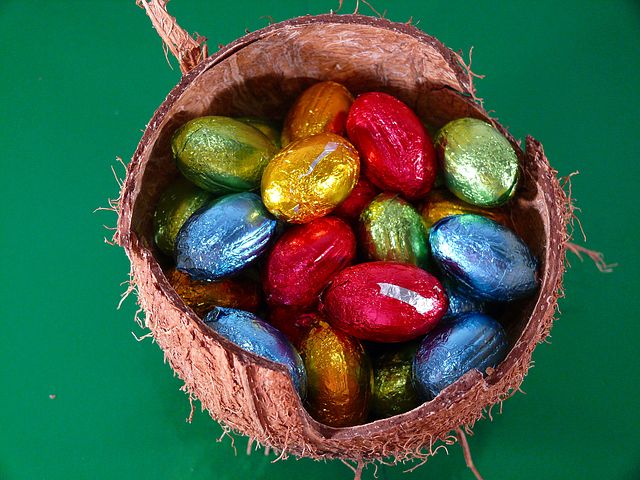Everything is good in moderation, even — especially — Easter candy! The even better news is that there are ways to indulge and enjoy the holiday if you celebrate it, while still protecting your pearly whites.
It is well known that candy is not the greatest or healthiest snack in the world for many reasons. Everyone has been told so by their dentist time and time again, and it’s important to keep it in the back of our minds when choosing a snack and brushing our teeth. There is no reason to not eat candy, though — especially on Easter when the candy is so bright, colorful, and just plain delicious. However, it is important to know what you are getting yourself into.
When planning for Easter this year, add a few minutes of prep and research about the best candy to your to-do list. To make that easier, we’ve compiled a few different ways to protect your teeth. Some candies are even good for and can be helpful to your teeth — yes, you read that right! Read on to find out which treat we’re talking about, and to start preparing for Easter baskets, egg hunts, and the aftermath.
Say no to sticky
Maybe you aren’t sure which Easter candies are bad for you and which ones are good — or at least, not so bad. That’s okay, because a lot of the work is done for you here. So, to start off with the bad news (and end with the better news), which Easter candies are the worst for your teeth? Short answer: the stickiest ones! That can include:
- Jellybeans
- Lollipops
- Hard candies
- Caramel
- Taffy

These are just a few examples of popular Easter candies that are fairly sticky and chewy. They get stuck in your teeth for quite a while, and leave acid in their wake. Sticky candy does just that: sticks to your tooth enamel.
Basically, the longer these candies linger in your mouth, the more damage there is to be done. Take hard candy or lollipops that are often sucked on for a while, or bitten into, which can potentially hurt and break teeth. This Easter, it might be better just to stay away from these sorts of treats.
And yes to (some) chocolate!
If you are looking for some candies you can say “yes” to this Easter, you will be excited to hear that chocolate is one of the safer routes you can go when trying to protect your teeth. Specifically, dark chocolate.
Dark chocolate is actually considered a superfood, which means it has benefits for your health and your teeth. It contains antioxidants and strengthens tooth enamel. While dark chocolate is the best, other chocolate, such as milk chocolate, is still a great choice for an Easter treat. It melts in the mouth much more quickly than jelly beans or hard candy, which we know can linger and be more damaging.
Although chocolate can be a great choice for many reasons, pay attention to the ingredients, and the more cacao you find on that list, the better! Cacao is the ingredient that is good for your teeth, and dark chocolate is 70% cacao while milk chocolate is usually much less due to added sugars.

Other tasty treats that should make the cut for you and your family this Easter include:
- Nuts or chocolate bars with nuts
- Almonds
- Sugar-free gum
- Fruits, especially apples — they have the same crunch as so many hard candies!
It might be a big transition to go from loading up Easter baskets with jelly beans and lollipops to fruits and sugar-free snacks. Make it a mixed bag this year, and make that transition slowly over the next few years.
Candy Alternatives
Candy is a favorite part of holidays like Easter, but it does not need to be the only part! Easter does not need to be totally candy free, but don’t forget to take extra steps to protect your teeth. Maybe that includes some candy alternatives, like a stuffed bunny, a new game or toy, or maybe even a gift card to a favorite place — perfect for any older children.

If Easter baskets seem like an impossible task with less candy, try an Easter egg hunt. You can put smaller, individual candies inside the eggs, or even some coins and other surprises to change things up a bit.
After Easter Care
Many dental health experts actually recommend that to make the most of protecting your teeth from sweets, and taking care of them after, you should consider eating most of your Easter candy in one go. Your teeth need some time to recover after indulging in sweet treats, and this makes that recovery much easier. However, it may lead to a stomach ache or blood sugar irregularities, so take caution.

You are also going to want to pay extra attention to brushing your teeth after eating sugary sweets. Implementing fluoride toothpaste into your family’s oral hygiene routine will make all the difference, as will helping your children brush. This goes for every time they brush up until a certain age, but especially after occasions when they are exposed to a lot of sugar, like Easter.
Teeth need that time to recover. While saliva is a natural process that helps fight off added sugars and acid, eating candy throughout the day will make the toothbrushing process more difficult. Make sure not to eat any sugar after brushing your teeth, too.
Taking charge of your oral health is always necessary, but even more so when the holidays filled with sugary snacks roll around. Get ahead of it this Easter, and take it a step further by scheduling a dentist appointment shortly after. Contact Dr. Wakim today!

